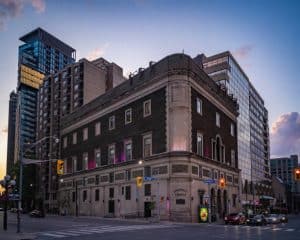
Toronto Guides
Masonic Temple Toronto
Written by Jordan Carter
In the center of Toronto, the Masonic Temple stands as a piece of the city’s history and beauty. Built in 1918, this famous building has seen many important events and changes over the years. Its unique style, with elegant columns and detailed designs, shows off an old-fashioned charm that still attracts visitors today. Over the years, the Masonic Temple has been used for various purposes, from meetings to a popular venue for many events.
Now, let’s explore the interesting history and many roles of the Masonic Temple to understand why this building is so special.
Masonic Temple Toronto
Historical Background
The Masonic Temple in Toronto, Canada, is a significant landmark with a rich history. Construction began on November 2, 1916, following the approval of the contract by the Board of The Masonic Temple Company. The cornerstone was laid in a Masonic ceremony on November 17, 1917, and the first Lodge meeting took place on New Year’s Day, 1918. At its peak, the Masonic Temple was home to 38 different Masonic bodies, including 27 Craft Lodges, six Chapters (York Rite), two Preceptories (Knights Templar), two Scottish Rite Bodies, and Adoniram Council.
Overview

The Masonic Temple, also known as The Concert Hall, is located at 888 Yonge St, at the northwest corner of Davenport Rd, in the Yorkville neighborhood of Toronto. This venue is easily accessible via major streets and public transportation. The building is a six-story structure, rich with Classical motifs. It has a capacity of 1,200, making it an ideal location for various events. The venue is particularly popular on nights when concerts and other performances are scheduled. Visitors can expect a unique blend of historical significance and modern entertainment in this iconic building.
Architectural Features
This place is a testament to the grandeur of classical architecture. The building’s exterior is adorned with intricate stone carvings, including Masonic symbols such as the square and compasses. The interior is equally impressive, featuring a grand staircase, ornate woodwork, and stained glass windows. The main auditorium, known as the Concert Hall, boasts a large stage and balcony seating, providing an intimate setting for performances.
Significance in Freemasonry
The Masonic Temple in Toronto holds a special place in the history of Freemasonry in Canada. It was once the meeting place for numerous Masonic Lodges and other Masonic bodies. The building’s design, filled with Masonic symbols, reflects the teachings and traditions of Freemasonry. Although no longer used primarily for Masonic purposes, the Temple remains a symbol of the fraternity’s rich history and enduring presence in Toronto.
Role as a Concert Venue

Image credit: The Concert Hall | Toronto Masonic Temple
In addition to its historical and architectural significance, the Masonic Temple is renowned as a concert venue, known as the Concert Hall. It was converted into a concert hall in the 1990s and has since hosted a wide range of musical performances. The acoustics of the hall, combined with its intimate setting, make it a favorite among performers and audiences alike. The venue’s unique blend of history and modern entertainment adds a unique dimension to every event held here.
Famous Performances
The Masonic Temple, in its role as a concert venue, has hosted a number of famous performances. Its stage has been graced by a diverse range of artists, from rock bands to solo artists, and from local talents to international stars. Some of the most memorable performances include those by Led Zeppelin, The Rolling Stones, and David Bowie, among others. These performances have not only entertained countless music lovers but also added to the rich history of the Masonic Temple.
This iconic building continues to be a cornerstone of Toronto’s cultural and architectural heritage. With its rich history, beautiful design, and versatile uses, the Masonic Temple remains a beloved landmark. Whether as a meeting place, a concert venue, or a symbol of Freemasonry, it stands as a testament to the city’s dynamic past and present. The Masonic Temple’s blend of historical significance and modern entertainment makes it a unique and enduring part of Toronto’s landscape.


















